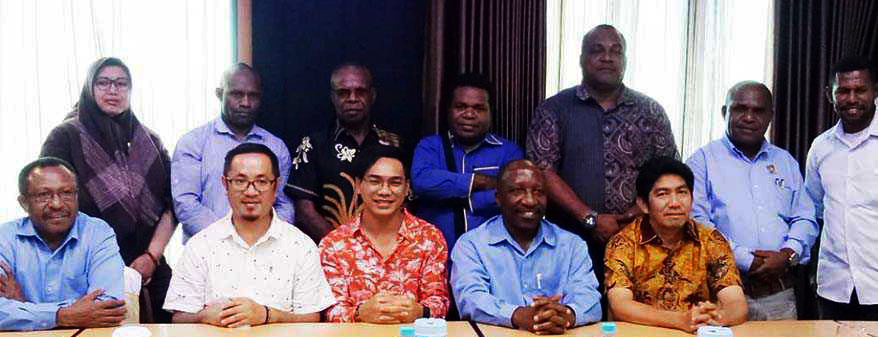CCA initiates advocacy in collaboration with parliamentarians in Papua to combat HIV and AIDS
 CCA staff with Papuan Members of Parliament
CCA staff with Papuan Members of Parliament
In response to the increasing incidence of HIV and AIDS in West Papua, the Christian Conference of Asia (CCA) initiated advocacy efforts in combatting HIV and AIDS in the region in collaboration with members of parliament in Papua.
As part of the CCA’s Action Together to Combat HIV and AIDS in Asia (ATCHAA) programme, advocacy dialogues with Papuan Members of Parliament and health officials were held from 17 to 29 February 2020.
CCA staff members Dr Ronald Lalthanmawia and Jay Roy Tipayan facilitated the meeting with Jhony B. Rouw, Chairman of the Papuan Parliament, together with six other members of Parliament of Papua, as well as chairpersons of Commission on Health, Education, Social Concern, and Religious Affairs.
Leaders of the Gereja Kristen Injili (GKI)-Tanah Papua Synod also were present at the meeting and discussed health issues of Papuans.
The crux of the meeting’s discussions was the emphasis on devising concrete plans for partnerships between the state and faith-based organisations to combat HIV and AIDS.
“We have talked about the challenges and opportunities in Papua’s health sector, and we envision a future where the local government and the church councils can collaborate to facilitate better health services for the people of Papua. The Papuan Parliament is open to working with the Papuan churches because the churches have been the first to respond to community health issues, especially in rural areas,” said Chairman of the Papuan Parliament.
Far-flung Papua in Indonesia has unique geographical and demographical challenges in accessing health services. The high prevalence of non-communicable and communicable diseases continues to disrupt the life of a vast majority of Papuans.
Dr Raymong Bachongo, from GKI-Tanah Papua’s Department of Health and Diakonia, who attended the meeting along with the CCA staff members said, “I am impressed by the warm reception of the Papuan Parliament, and the opening up of the potential of collaboration and cooperation between the Church and the State. This alliance will greatly improve grassroots mobilisation for combatting HIV and AIDS, and help to improve the overall quality of health services for all Papuans.”
A CCA training programme for 25 pastors and teachers from GKI-Tanah Papua in Sarmi district emphasized the need to be equipped with the necessary knowledge and skills on health and healing.
A two-day youth motivation programme for 30 young people was also conducted in Jayapura klasis of GKI-Tanah Papua to strengthen their knowledge and skills in responding to HIV in Papua.
The CCA programme staff also facilitated motivational conversations with other youth and women’s groups from different klasis.
A health and healing seminar held in Selokah Tinggi Filsafat Teologi (STFT)- Izaak Samuel Kijne, the regional theological college, challenged theological students to adopt a holistic view of health and healing that will be integrated with the spiritual, physical, emotional, and social perspectives.
As an outcome of this programme, GKI-Tanah Papua Synod will propose strategies of intervention and sustain the dialogue with the government and other civil society organisations. The CCA will continue to provide accompaniment as Papuans journey towards mitigating the HIV and AIDS epidemic in Papua.










